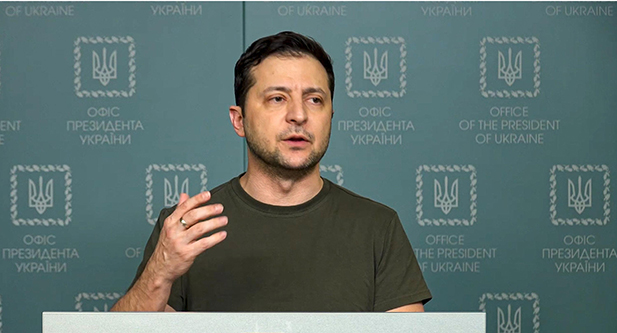President Zelenskyy as strategic communicator and leader

Photo: Shutterstock
What is special about Zelenskyy's way of communicating?
Zelenskyy – and his staff of professional communicators – are very good at strategic communication, and it should be noted that Zelenskyy was an actor and a comedian before he was elected president in 2019. He is trained to be on the stage and in the limelight, communicating to the audience not only with words, but also by way of voice control and being conscious of his body language, posture, visual identity etc.
In contrast to many other politicians who tend to choose strategic ambiguity as a tool to keep messages open to various interpretations by different audiences, Zelenskyy speaks very concisely, directly, and straightforwardly about serious issues.
For example, when he is addressing the ordinary Russian people, he speaks calmly and with dignity. He emphasizes that “We are neighbours, we share more than 2,000 km border. We are different, but it does not make us enemies”. He then appeals to them to resist Putin´s strategy of making Russia greater again and to be doubtful of his reasons for attacking Ukraine. “You are told we are Nazis. But how can we be called Nazis after sacrificing more than eight million lives to eradicate Nazism?”
When addressing the US government who offered to evacuate him, his answer was “We need ammunition, not a ride.” This statement, a one-liner, was also printed on a t-shirt, and posted on Twitter, ready to be re-tweeted and disseminated.
Zelenskyy speaks with such pathos it evokes compassion with the Ukrainian people among leaders in EU and around the world, and he makes politicians take significant U-turns – by way of example, the German chancellor, who first decided not to offer any weapons, but then changed his mind.
Zelenskyy´s speeches generate motivation among his citizens to remain in Ukraine and engage in the battle with the Russian army. Wearing an army green t-shirt or jacket, he looks like a soldier/a warrior and thus communicates; I am one of you, I also fight! This is a great contrast to Russian politicians who present as powerful decision-makers in the huge and elegant halls of Kremlin, and whose negotiators in Belarus always shows up in black suits, white shirts, and silk ties.
Zelenskyy appears in videos with members of his government in the inner city of Kyiv, with recognizable public buildings in the background. He mentions everyone among his closest aides by name and states that “We are all here!” He thereby emphasizes that he and his government remain in Kyiv. They are not just hiding in a shelter or escaping, even though they know that this war is a battle between David and Goliath, and that Zelenskyy and his family are Putin´s targets number one and two.
Thus, Zelenskyy speaks to all relevant target groups, and he switches code and language depending on the specific audience. He makes use of several communication channels: videos of his speeches are broadcast on YouTube and Twitter, brief statements are posted on Facebook and TikTok, and they all go viral.
Zelenskyy sends pleas to the politicians at the security conference in Munich, to the statesmen in EU, the US president, and the NATO member states: “Without you, Ukraine is going to be alone. We are fighting to be equal members of Europe. Do prove that you will help us.”
He speaks Ukrainian to his citizens to unite the nation and motivate the men to stay and fight for Ukraine. He uses strong metaphors, such as the image of “the iron curtain”, which reminds them of the divisions between Western and Eastern Europe after WW 2. But here, it is used to illustrate a future division between the civilized world and Russia; a country that is being excluded because of its brutal attack on Ukraine:
“What we have heard today are not just missile blasts, fighting and the rumble of aircraft. This is the sound of a new iron curtain, which has come down and is closing Russia off from the civilized world.”
He speaks in Russian, his native language, to the ordinary Russian people, ideally including the soldiers in the Russian Armed Forces, stating that “We are going to defend ourselves. Not attack – defend. By attacking us, you are going to see our faces, not our backs.” Thereby, he stresses that Ukrainians are not cowards; they have the courage to confront the Russians and fight upfront.
As a leader, what can you learn from the Zelenskyy's leadership?
I think it is important to emphasize that what makes a great leader is not just a matter of personality, it also depends on the specific context. Gandhi was a great leader in his fight against British colonialism; Mandela was a great leader in his resistance to apartheid. Zelenskyy has to navigate a significantly different political context. But he knows how to navigate in chaos and perform under pressure, and that is something other leaders can learn from him, although hopefully, they will not have to face as desperate a situation as that of war.
Zelenskyy seems to have what has been called “Battle Mind”. A term introduced by one of CBS´ great alumni, Merete Wedell-Wedellsborg. She is one of my former PhD-students, who now works as a corporate psychologist and business consultant for top managers, and she is professor of leadership at the IMD Business School in Lausanne.
Zelenskyy stays cool, calm, and collected despite the desperate situation he is in, and that of course, also has something to do with his personality, his personal integrity as well as his courage and ability to act.
Moreover, Zelenskyy is visible through his many video-speeches to various audiences. He is concise and focused in his communication, and he shows that communicating well and being convincing and trustworthy is an integrated part of being a strong leader.
He is consistent in practicing what he asks of his citizens, illustrated by him and his government remaining in Kyiv. He shows emotional commitment to the Ukrainian people; he fights for them and that inspires them to show their loyalty and fight against the Russian Armed Forces.
He also shows that he is not alone, but part of a team and a network, and that a government leading the nation as a team makes them stronger in their fight for the nation´s independence.
Below is a link to a recent publication where I analyse crisis communication and management in Denmark and Sweden in the context of a global pandemic. The article has descriptions of the situation in 19 countries around the world.
